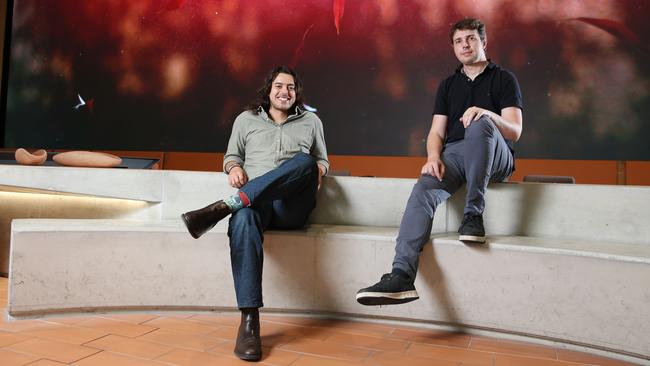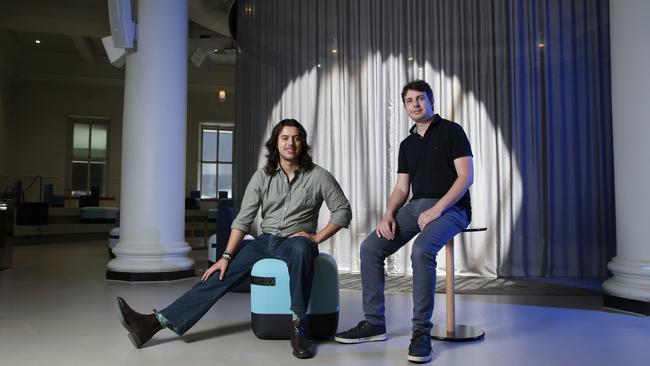How Mount Druitt kid’s start-up Arlula ended up managing Japanese government satellites
A 30-year-old who spent his high school summers at space camps has inked a deal with the Japanese government to provide and manage satellite imagery and data.

A 30-year-old from Sydney’s Mount Druitt who spent his high school summers at space camps has inked a deal with the Japanese government to provide and manage satellite imagery and data.
Sebastian Chaoui says he fell in love with aviation as a kid, and after a couple of summer camps at the University of Queensland and University of NSW, that passion was elevated.
This month, his Sydney-based start-up, Arlula, inked a multi-year deal worth hundreds of thousands of dollars annually with the Japanese government, via the country’s biggest telco NTT.
Arlula’s Geostack technology will be used by Japan’s government to control and task a total constellation of 50 satellites for data and image collection and analysis.
The deal was triggered by a handful of innocent questions at a conference in December last year.
Mr Chaoui and his co-founder Arran Salerno were backed by Investment NSW to host a stand at the Andy Thomas Space Forum in Sydney, where they were approached by an unassuming visitor, who turned out to be one of NTT’s space engineers.
“It was very much a curious set of questions about how it works and what it does and, you know, we were just sort of answering them … we didn’t think that this would lead to one of Arlula’s biggest deals,” says Chaoui.
NTT is a multibillion-dollar telecommunications and data company, with offices spread across the world – including in Sydney, where it also has a data centre.
“What we later realised was they were doing a discovery process and a due-diligence process on us to evaluate whether our technology was suitable to support the Japanese government,” Chaoui says.
The event, at Sydney’s International Conference Centre, took place seven months after the pair had raised $2.2m in a seed round led by Main Sequence, the venture capital arm of CSIRO.

Arlula, which launched in 2018, is a new earth observation business, and sells satellite imagery and data from as little as $10.
Chaoui had been shopping around for ideas to enter the space market since 2015.
“I’ve been a tragic for space ever since I was a kid and I really wanted to get into the space industry when I was at university back in 2015, but there were just no jobs so I had to basically invent my own,” he says.
He then met his co-founder, Salerno, 41, at the University of Technology’s space society in 2016, and within two years the pair had the start-up up and running, with customers including corporations, mining sites, oil rigs and agriculture businesses.
Some of its customers have been curious homeowners, while others include the likes of Lockheed Martin and the US Spaceforce.
After the conference, conversations continued over email for about 10 months before Arlula was able to get the deal with the Japanese done.
The process of collecting and analysing satellite data and images has for years been a clunky one, Chaoiu tells The Australian.
“We streamline that and make it really simple for people who don’t know much about satellites or space engineering to be able to go and, with a click of a button, get a spacecraft in orbit to capture an image of, say, the South China Sea,” he says.
The deal was validating in a lot of ways, Mr Chaoui says, and was further evidence that Australian space businesses can have a global impact. But most Australian businesses struggle to get local support, he says.
“There are governments and entities and agencies around the world trusting Aussie companies to deliver very complex space technology products, and I think we’d like to see that trust placed in us from our own government as well,” he says.
Support could also inspire more kids from areas like where he grew up, in Mount Druitt in Sydney’s west – a suburb known for crime and a subgenre of hip hop called drill – to join the industry, he believes.
“If we can get government support and get them to become customers of this kind of technology, I think it could be really inspiring, so it’s not just the sort of people from affluent areas who start technology companies,” Chaoiu says.
But for now, most Australian space companies who want to grow and scale are having to look abroad at the US and Japan, he says.
While he credits the support the federal government has provided in the form of grants, Chaoiu says “what Arlula and a lot of local companies would like to see is the Australian government becoming a customer of domestic products and services that have been produced by our local space ecosystem”.






To join the conversation, please log in. Don't have an account? Register
Join the conversation, you are commenting as Logout